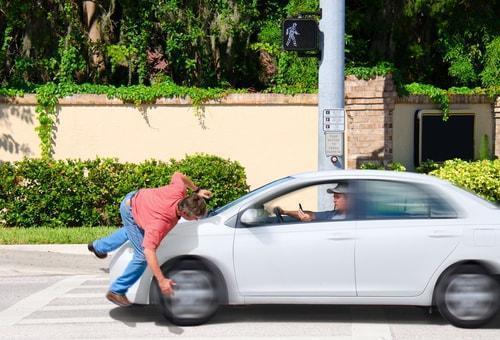The Potential Legal Complexities in Illinois Pedestrian Accidents
 The number of pedestrian accidents that occur each year in the United States is alarming. According to a report released by the Governors Highway Safety Association (GSA), almost 7,500 people were killed in pedestrian accidents last year, an increase of almost 12 percent from the year before. This is the largest number of pedestrian accident fatalities recorded in 40 years. There are thousands more people hit by vehicles who do survive but suffer serious injuries that leave them with long-term or permanent disabilities.
The number of pedestrian accidents that occur each year in the United States is alarming. According to a report released by the Governors Highway Safety Association (GSA), almost 7,500 people were killed in pedestrian accidents last year, an increase of almost 12 percent from the year before. This is the largest number of pedestrian accident fatalities recorded in 40 years. There are thousands more people hit by vehicles who do survive but suffer serious injuries that leave them with long-term or permanent disabilities.
Causes of Pedestrian Accidents
The most common cause of pedestrian fatalities is speeding, increasing by almost 10 percent in just one year. Per the GSA’s report, speeding is also becoming a significant factor in fatal pedestrian accidents involving children, with percentages doubling as the cause of the accident in a two-year period.
Distracted driving is also a major problem on roads, responsible for killing more than 3,000 people each year – many of those killed pedestrians. However, another issue that safety advocates and researchers have discovered that is becoming a more common factor in pedestrian accidents is distracted walking.
Just as drivers become distracted because of their smartphones and/or information and entertainment systems by texting, checking social media, etc., so too do pedestrians. And due to Illinois following the comparative negligence doctrine in personal injury law, a distracted pedestrian injured in a traffic accident may have some issues when pursuing damages against the party that hit them.
Comparative Negligence
Under the comparative negligence doctrine, the award amount the person may be entitled to for their damages can be reduced by the percentage a judge or jury thinks they may be at fault. Consider these two examples:
A driver quickly takes a turn on red without checking to see if there is anyone crossing. There is a pedestrian crossing, who is paying attention, and sees they have the right of way to cross, but a vehicle pulls up so quickly to turn, without slowing down, that the pedestrian does not have enough time to get out of the way and is hit by the vehicle. Under Illinois law, that driver would be liable for all of the damages the pedestrian suffers due to their injuries.
Consider the same above example, but this time, the pedestrian is looking down at their phone and not paying attention as they cross the street. The same driver pulls up to the light and quickly turns, not seeing the pedestrian, and hits them. Under the comparative negligence doctrine, a jury could decide the pedestrian was partially at fault for not paying attention and engaging in distracted walking, assign a percentage of fault, and then deduct that percentage from the final award amount they deem the case is worth.
Contact a Cook County Personal Injury Lawyer for Legal Assistance
It is not uncommon for the at-fault driver’s insurance company to try to assign fault to the person who has been injured in an accident in order to avoid paying them what they deserve. If you or a loved one have been injured in a pedestrian accident, call Adler Injury Law, Ltd. at 312-236-2700 to schedule a free consultation with one of our dedicated Arlington Heights, IL pedestrian accident attorneys. We will fight to get you the compensation you deserve.
Sources:
https://www.law.cornell.edu/wex/comparative_negligence
https://injuryfacts.nsc.org/motor-vehicle/motor-vehicle-safety-issues/distracted-driving/
https://www.ghsa.org/resources/Pedestrians22
No Fee Unless We Win







 312-236-2700
312-236-2700






